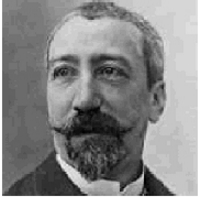- Anatole France
Infobox Writer
name = Anatole France
awards = awd|Nobel Prize in Literature |1921

birthdate = birth date|1844|4|16
birthplace =Paris ,France
deathdate = death date and age|1924|10|12|1844|4|16
deathplace =Tours ,France
occupation = novelist
nationality = FrenchAnatole France (16 April 1844—12 October 1924), born François-Anatole Thibault, was a French poet, journalist, and novelist. He was born in
Paris , and died inSaint-Cyr-sur-Loire . He was a successful novelist, with several best-sellers. Ironic and skeptical, he was considered in his day the ideal French man of letters. He was a member of the "Académie française ", and won theNobel Prize for Literature .Early life
The son of a bookseller, France spent most of his life around books. His father's bookstore, called the "Librairie France," specialized in books and papers on the
French Revolution and was frequented by many notable writers and scholars of the day.] Anatole France studied at the "Collège Stanislas " and after graduation he helped his father by working at his bookstore. After several years he secured the position of a cataloguer at Bacheline-Deflorenne and at Lemerre. In 1876 he was appointed a librarian for the French Senate.Literary career
Anatole France began his career as a poet and a journalist. In 1869, "Le Parnasse Contemporain" published one of his poems, "La Part de Madeleine". He became famous with the novel "Le Crime de Sylvestre Bonnard" (1881). Its protagonist, skeptical old scholar Sylvester Bonnard, embodied France's own personality. The novel was praised for its elegant prose and won him a prize from the French Academy. In "La Rotisserie de la Reine Pedauque" (1893) Anatole France ridiculed belief in the occult; and in "Les Opinions de Jerome Coignard" (1893), France captured the atmosphere of the "
fin de siècle ".He was elected to the "Académie française" in 1896.
France took an important part in the
Dreyfus Affair . He signedEmile Zola 's manifesto supporting Dreyfus, a Jewish army officer who had been falsely convicted ofespionage . France wrote about the affair in his 1901 novel "Monsieur Bergeret".France's later works include "L'Île des Pingouins" (1908) which satirizes human nature by depicting the transformation of penguins into humans - after the animals have been baptized in error by the nearsighted Abbot Mael. "La Revolte des Anges" (1914) is often considered France's most profound novel. It tells the story of Arcade, the guardian angel of Maurice d'Esparvieu. Arcade falls in love, joins the revolutionary movement of angels, and towards the end realizes that the overthrow of God is meaningless unless "in ourselves and in ourselves alone we attack and destroy Ialdabaoth."
He was awarded the Nobel Prize in 1921. He died in 1924 and is buried in the
Neuilly-sur-Seine community cemetery near Paris.In the 1920s, France's writings were put on the "
Index Librorum Prohibitorum " (Prohibited Books Index) of theRoman Catholic Church .Works, partial list
* "Les Légions de Varus", poem published in 1867 in the "Gazette rimée".
* "Le Crime de Sylvestre Bonnard" ("The Crime of Sylvestre Bonnard"), 1881
* "The Amethyst Ring"
* "Thaïs", 1890
* "Le Jongleur de Notre Dame ", 1892
* "La Rotisserie de la Reine Pedauque" ("At the Sign of the Web-Footed Queen"), 1892
* "Les Opinions de Jerome Coignard" (1893)
* "Le Lys Rouge" ("The Red Lily"), 1894
* "Epicure's Garden", 1895
* "L'Humaine Tragedie" ("The Human Tragedy")
* "Crainquebille; Putois; Riquet; et Plusieurs Autres Recits Profitables"
* "Les Sept Femmes de la Barbe-Bleue et Autres Contes Merveilleux" ("The Seven Wives of Bluebeard, and Other Marvelous Stories")
* "Monsieur Bergeret á Paris", 1901
* "Le Procurateur de Judée" ("The Procurator of Judaea"), 1902
* "Sur la Pierre Blanche", 1905
* "The Man Who Married A Dumb Wife"
* "L'Île des Pingouins" ("Penguin Island"), 1908
* "The Life of Joan of Arc", 1908
* "Mother of Pearl"
* "Les Dieux Ont Soif" ("The Gods Are Thirsty"), 1912
* "La Revolte des Anges" ("The Revolt of the Angels"), 1914Famous sayings
* "I prefer the folly of enthusiasm to the indifference of wisdom."
* "The law, in its majestic equality, forbids rich and poor alike to sleep under bridges, to beg in the streets, and to steal their bread."
* "To accomplish great things, we must not only act but also dream, not only plan but also believe."
* "Irony is the gaiety of reflection and the joy of wisdom."
* "Wandering re-establishes the original harmony which once existed between man and the universe."
* "For every monarchy overthrown the sky becomes less brilliant, because it loses a star. A republic is ugliness set free."
* "She fought him off vigorously, scratched, cried that she will die before she submits, but the chevalier paid no attention to her words and took her. Afterwards, she smiled coyly and told him: "Do not think, dear chevalier, that you won me against my will. Better thank our good preacher who reminded me that we are mortal, and a pleasure missed today is missed forever. Now we can proceed, for I missed too many pleasures while being too prudent for my own good." (Fable by Anatole France.)
* "Nine tenths of education is encouragement."
* "All religions breed crime." ("Thaïs")
* "The people who have no weaknesses are terrible: there is no way of taking adventage of them." ("The Crime of Sylvestre Bonnard")
* "It is human nature to think wisely and act in an absurd fashion."Notes
External links
*
* [http://www.archive.org/search.php?query=creator%3A%28france%2C%20anatole%29%20-contributor%3Agutenberg%20AND%20mediatype%3Atexts Works by Anatole France] atInternet Archive
* [http://www.nytimes.com/packages/html/books/nobel-France.pdf "Anatole France, Nobel Prize Winner"] by Herbert S. Gorman,The New York Times , 20 November 1921
* [http://www.surlalunefairytales.com/bluebeard/fiction/anatolefrance.html The Seven Wives of Bluebeard (English) by Anatole France]
* [http://www.surlalunefairytales.com/sleepingbeauty/fiction/anatolefrance.html The Story of the Duchess of Cicogne and of Monsieur de Boulingrin (English) by Anatole France]
* [http://www.litweb.net/biography/478/Anatole_France.html LitWeb.net: Anatole France Biography]Persondata
NAME= Thibault, Jacques Anatole François
ALTERNATIVE NAMES= France, Anatole (pen name)
SHORT DESCRIPTION= Frenchnovelist
DATE OF BIRTH= birth date|1844|4|16|df=y
PLACE OF BIRTH=Paris ,France
DATE OF DEATH= death date|1924|10|21|df=y
PLACE OF DEATH=Tours ,France
Wikimedia Foundation. 2010.
